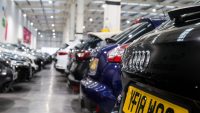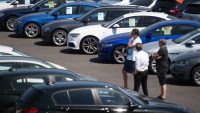Renault will fight plans by the European Commission that would ban the sale of hybrid vehicles from 2035, the French firm has confirmed.
Earlier this year the executive branch of the EU proposed a new ruling that car makers must cut their fleet CO2 by 55 per cent by 2030 before achieving net zero by 2035.
The move would effectively outlaw the sale of new hybrid vehicles and force manufacturers to fully electrify their ranges.
However, speaking at the Munich Motor Show, one of the Renault’s most senior officials has vowed to argue against the new law.
Gilles Le Borgne, Renault Group’s director of R&D, wants the new measures to be pushed back and has described 2040 as a more reasonable target.
Chief among his concerns was how Dacia would be able to transition so soon to a fully electrified range while still keeping prices low.
Le Borgne insisted that Renault is not opposed to the transition in principal but believes the timeline is too rushed.
‘First, I must be clear that we aren’t resistant to the transition,’ he said.
‘We were the first to move to sell electric vehicles and we have more of them on European roads than any other manufacturer.
‘But there are three clear reasons why we believe it makes sense to extend the transition.
‘Firstly, we want absolute confidence that the infrastructure matches the rate at which BEVs are mandated.
‘That’s far from certain, and to go faster makes no sense.
‘Then, while we have absolute confidence that we have the technology – hybrid, plug-in hybrid and BEV are all on sale today – we don’t know if we have the customers who want it or, more significantly, can afford it.’
He added: ‘Finally, and critically, we need time to adapt.
‘Switching our factories over to these new technologies isn’t simple and adapting our workforce to it will take time.
‘You can’t switch just like that, and such a timeline would be hard for us – and harder still when you work the supply chain into the mix.
‘I want to be clear: I’m not pushing back for technological reasons. We are ready.
‘We have said that Renault will sell 90 per cent BEV vehicles by 2030 and Alpine 100 per cent, but we think Dacia will be closer to 10 per cent.
‘Society is built on freedom of movement, and unless it’s affordable, it will have an undesirable impact.
‘People need to move – and a popular brand like Renault has to be able to offer them a chance to do so in a practical way and at an affordable price.’


































